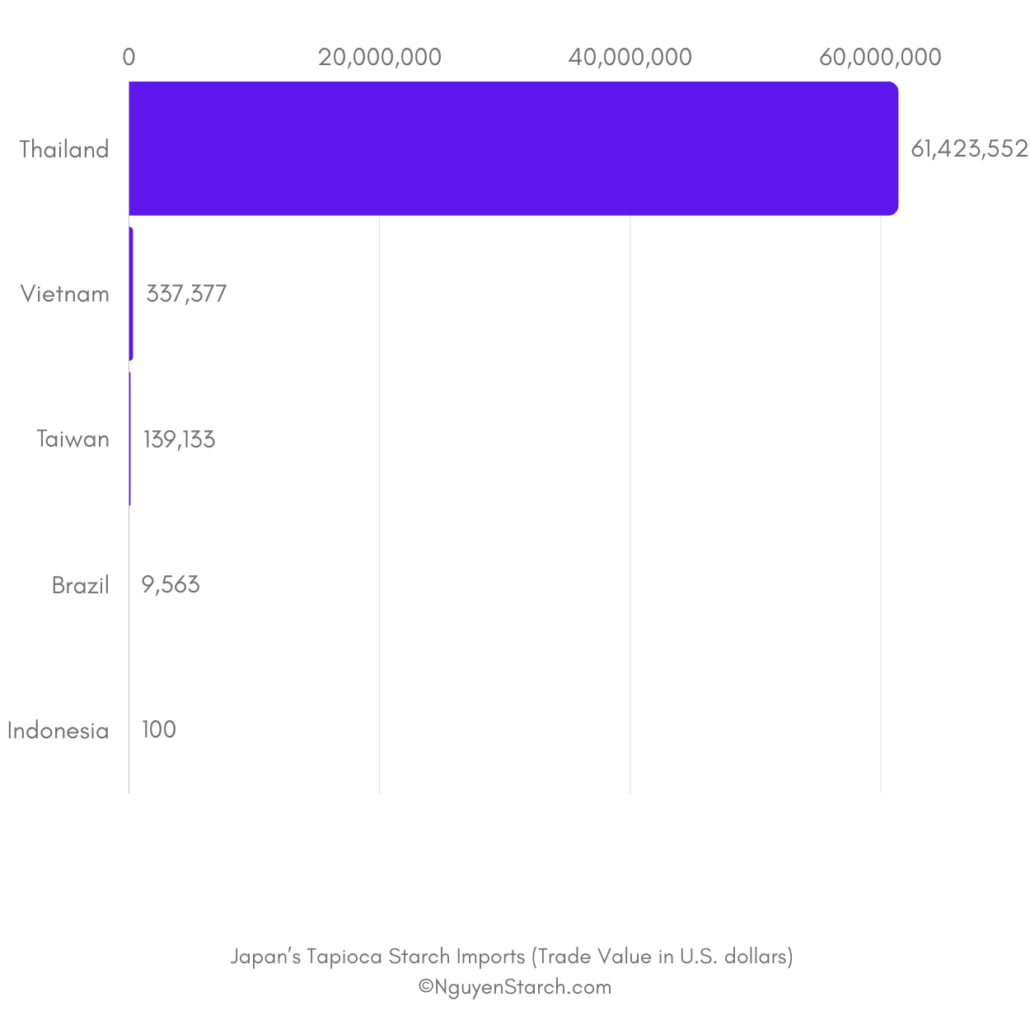Japan’s involvement in the tapioca starch trade demonstrates its role both as an exporter and a major importer. While Japan’s export volumes remain relatively modest, it plays a significant role in importing tapioca starch from countries such as Thailand, Vietnam, and Chinese Taipei.
Exports
In 2021, Japan exported $46.5k worth of tapioca starch, positioning itself as the 51st largest global exporter of the product. Tapioca starch ranked 4250th among Japan’s export commodities for that year, indicating its relatively lower prominence in Japan’s export market.
The primary destinations for Japan’s tapioca starch exports were Austria, China, Malaysia, Hong Kong, and Thailand. Austria stood out as the main recipient, importing tapioca starch valued at $35.3k. China followed with imports totaling $5.03k, while Malaysia, Hong Kong, and Thailand imported $2.18k, $2.03k, and $598 worth of tapioca starch, respectively.
Between 2020 and 2021, Japan experienced notable growth in its export markets for tapioca starch. Austria demonstrated significant progress, with an increase of $35.3k in tapioca starch imports from Japan. Malaysia also showed promising growth, with an additional $2.18k in imports. Singapore joined the ranks of growing markets with imports amounting to $467.
| Continent | Country | Trade Value |
| Asia | China | 5,031 |
| Asia | Hong Kong | 2,032 |
| Asia | Indonesia | 270 |
| Asia | South Korea | 40 |
| Asia | Macau | 571 |
| Asia | Malaysia | 2,178 |
| Asia | Singapore | 467 |
| Asia | Thailand | 598 |
| Asia | Chinese Taipei | 65 |
| Europe | Austria | 35,296 |
Imports
In 2021, Japan became the fourth largest global importer of tapioca starch, with imports valued at $61.9M. Tapioca starch ranked 1162nd among Japan’s imported products, reflecting its significant import volumes. Japan primarily sourced tapioca starch from Thailand, which accounted for the majority of imports at $61.4M. Vietnam and Chinese Taipei followed with imports of $337k and $139k, respectively. Brazil and Indonesia also contributed to Japan’s tapioca starch imports, providing $9.56k and $100 worth of the product, respectively.

Between 2020 and 2021, Japan witnessed remarkable growth in its import markets for tapioca starch. Thailand, as the leading supplier, experienced a significant increase of $12.9M in tapioca starch exports to Japan. Brazil demonstrated progress as well, with an additional $3.23k worth of imports. Indonesia contributed to this growth with an increase of $100.
| Continent | Country | Trade Value |
| Asia | Indonesia | 100 |
| Asia | Thailand | 61,423,552 |
| Asia | Vietnam | 337,377 |
| Asia | Chinese Taipei | 139,133 |
| South America | Brazil | 9,563 |
Importing Tapioca Starch from Vietnam: A Reliable Partnership
Vietnam has emerged as a prominent supplier of tapioca starch to the Japan market. In 2021, the total value of tapioca starch imports from Vietnam amounted to an impressive $337,377. This significant figure indicates that Vietnam’s tapioca starch holds a strong position in the market and is poised to maintain its presence in Japan in the years to come. The reasons behind this sustained importation are primarily attributed to the product’s superior quality and competitive pricing.
Japan benefits from Vietnam’s tapioca starch exports, which provide a dependable supply of this vital ingredient. The substantial import value from Vietnam underscores Japan’s confidence in Vietnam as a trusted and preferred partner for fulfilling its tapioca starch requirements. With its consistent quality and competitive pricing, Vietnam’s tapioca starch has proven to be a reliable source that meets Japan’s demand for this essential product.
Tariffs
In 2019, Japan imposed an average tariff of 128% on tapioca starch imports. Notably, countries such as Eritrea, Equatorial Guinea, Lebanon, North Korea, and Timor-Leste had the highest import tariffs, with a Most Favoured Nation duty rate treatment of 248%.
The imposition of these high tariffs aimed to protect Japan’s domestic tapioca starch industry and foster self-sufficiency in production. By creating significant trade barriers for imported tapioca starch, Japan sought to support local producers and ensure the growth of its domestic market.
Source: BACI and General Statistics Office of Vietnam
